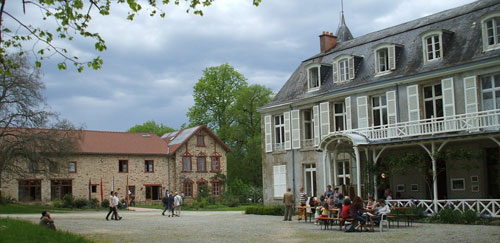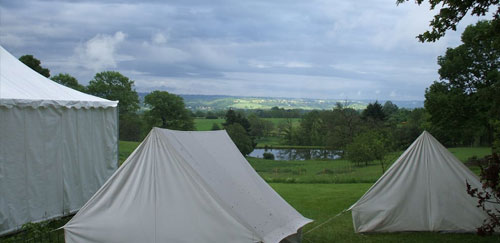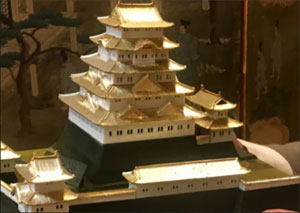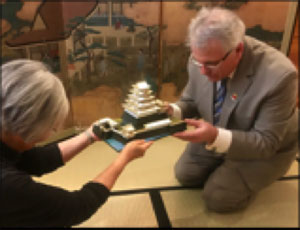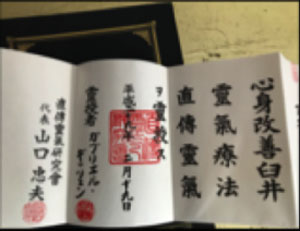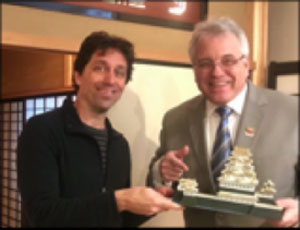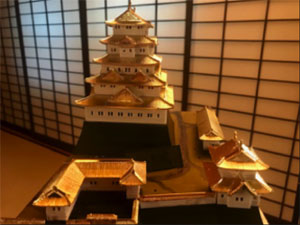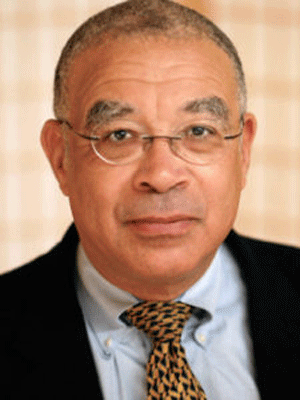February 19, 2019
NOTICE: THIS WORK MAY BE PROTECTED BY COPYRIGHT
YOU ARE REQUIRED TO READ THE COPYRIGHT NOTICE AT THIS LINK BEFORE YOU READ THE FOLLOWING WORK, THAT IS AVAILABLE SOLELY FOR PRIVATE STUDY, SCHOLARSHIP OR RESEARCH PURSUANT TO 17 U.S.C. SECTION 107 AND 108. IN THE EVENT THAT THE LIBRARY DETERMINES THAT UNLAWFUL COPYING OF THIS WORK HAS OCCURRED, THE LIBRARY HAS THE RIGHT TO BLOCK THE I.P. ADDRESS AT WHICH THE UNLAWFUL COPYING APPEARED TO HAVE OCCURRED. THANK YOU FOR RESPECTING THE RIGHTS OF COPYRIGHT OWNERS.
Dear Members of the Shambhala Community,
I write to you today with a very heavy heart. This is an incredibly painful time for all of us. However, in many ways, I feel that the situation we find ourselves in as a community was inevitable. The deep dysfunction and unkindness at the heart of our organization has been like a festering boil that finally burst. The revelations that have come to light over the last year have been horrifying. It has been so shocking to hear how women have been harmed. The abuse of power and violation of trust that allowed this to occur is unimaginable. As an organization and as individuals, we need to do whatever we can to support not only the women who have been abused but, as we now know, the men who are victims as well.
I have been heartbroken for years as I have watched the expansive vision of the Vidyadhara becoming more and more reduced. He used to say that Shambhala was a vast umbrella that would encompass many different activities and levels of practice. Over the last two decades, our community has become fractured, and the teachings that promise the way toward manifesting an enlightened and compassionate society have become hollow words.
During my seventeen-year marriage to the Vidyadhara I saw him manifest and teach in many different ways. The priority for him was always to find the best way to connect with people. I am sure that if he were alive today, he would be using totally different forms to interact with his students than those he employed during the era in which he was teaching. During his lifetime, he created the Kalapa Court to be a vehicle for students to have access to him. The current interpretation of court is a perversion of the initial intention. The Vidyadhara’s court was designed to build a bridge for his students to interact with him. The current model has built a wall.
I feel that the model of the court and of monarchy has become an obstacle, within which, as we have recently heard, there were abuses and cruelty. I have avoided the court situation for many years, having felt increasingly uncomfortable in that environment. It has been very sad for me, but I felt that I had to distance myself. At the same time, not being aware of the harm that was being perpetrated, I felt that it would only have caused divisiveness to speak out publicly about what I perceived to be a misunderstanding of the teachings. I have watched so many of the beautiful parts of our culture disappear and be replaced by what I have perceived to be a culturally bound religiosity. Like many others, I also have felt marginalized and have been subject to unhealthy power dynamics. If I had thought that speaking out publicly would have helped, I would have done so. In many respects, I now regret that I did not do so earlier. Privately, over the years, I have tried to give the Sakyong advice, but his reaction has been to avoid communication with me. I wrote to him twice last summer imploring him to take responsibility for his actions. We spoke on the phone, and I made a similar plea. Ultimately it is up to him to do what he can to repair the harm he has created.
There has been much discussion about the Sakyong’s childhood. He had a very difficult time growing up. When he arrived in this country as a traumatized ten-year-old child, I, his stepmother, was nineteen. I did not have the parenting skills to help him sufficiently. I am sorry about this and wish it had been different. His father was always loving toward the Sakyong but did not give him as much attention as he needed. This too is sad, but we all have different degrees of trauma. It is the nature of life and doesn’t really excuse his abuse of power and all that went along with it.
There also has been plenty of discussion about the Vidyadhara over the past year. I feel that it is my duty to be completely honest about his life.He was the most brilliant, kind, and insightful person that I have ever met. He was also ultimately unfathomable. When one examines his life, it is easy to make judgements, since his behavior was so unconventional. He was a human being and was not perfect, but he was unrelentingly kind and helped many, many people. During this difficult time, many people have spoken up about how he saved their lives. This is how they have put it, and I can connect with that completely.
I am a 65-year old woman who was sexually assaulted many times by Chogyam Trungpa Rinpoche when he first settled in Boulder in the early 70s. I was the same age as, and friends with, his wife, Diana Mukpo. Having her husband sexually assault me over the course of two years when I was in my late teens, eroded my sense of self, trust in friendships and the very understanding of the core of Buddhism -- to do no harm.
-- An Olive Branch Report on the Shambhala Listening Post
I recounted a story from veteran Kusung who was violently assaulted by Chogyam Trungpa. Knocked to the ground and kicked multiple times with boots on....
-- An Open Letter to the Shambhala Community from Long-Serving Kusung To the Shambhala community, by Craig Morman, Ben Medrano, MD, Laura Leslie, Louis Fitch, David Ellerton, Allya Canepa
“It was summer of 1985. I "married" Rinpoche on June 12th of that year. I met him around May 31st at a wedding of Jackie Rushforth and Bakes Mitchell in the back yard of Marlow and Michael Root's home. That year, we had our wedding at RMDC a few days before Assembly, then we had Seminary and Encampment happened during Seminary.
That was the year he spoke of limited bloodshed and taking over the city of Halifax and the Provence of Nova Scotia. We were in the middle of the Mahayana portion of seminary teachings. For weeks, CTR (Chögyam Trungpa Rinpoche) had been asking everyone he saw if they had seen a cat. He asked the head cook, the shrine master, and all of his servants if they'd seen one. We returned to our cabin late one night after a talk and there was this beautiful tabby cat sitting on the porch. I said, "Here kitty, kitty" and it came right over to me, purring and rubbing against my legs. I picked it up and said: "Here, Sweetie. Here's the cat you've been wanting."
I can't remember exactly which guard was on duty, but I think it was Jim Gimian, and of course Mitchell Levy. Someone took the cat from me and Rinpoche ordered them to tie him to the table on the porch. He instructed them to make a tight noose out of a rope so the cat didn't get away. He stood over his guards to examine the knots and make sure they were secure. I was curious at this point, wondering what this enlightened master had in mind for the cat. I knew there were serious rodent problems on the land and I assumed he wanted to use the cat for this problem.
Then, he instructed the guard to bring him some logs from the fire pit that was in front of the porch, down a slight slope. We took our seats. Rinpoche was seated to my right and there was a table between us for his drinks. He ordered a sake. The logs were on his right side, so he could use his good arm. (His left side was paralyzed due to a car accident that happened in his late twenties.)
The cat was still tied by a noose to the table. Rinpoche picked up a log and hurled it at the cat, which jumped off the table and hung from the noose. It was making a terrible gurgling sound. He finally got some footing on the edge of the deck and made it back onto the porch. Rinpoche hurled another log, making contact and the cat let out a horrible scream as the air was knocked out of him.
I said: "Sweetie, stop! What are you doing? Why are you doing this?" He said something about hating cats because they played with their food and didn't cry at the Buddha’s funeral. He continued to torture the poor animal. I was crying and begging him to stop.
I said, "I gave you the cat. Please stop it!" I'll never forget his response. He looked at me and said: "You are responsible for this karma" and he giggled. I got up to try and stop him and he firmly told me to sit down. One of the guards stepped closer to me and stood in a threatening manner to keep me in my place.
The torture went on for what seemed like hours, until finally the poor cat made a run for his life with the patio table bouncing after him. It was clear he had a broken back leg. I'm sure that cat died. I looked for him or the table for the rest of Seminary and never found either. I imagined him fleeing up the mountain and the table catching on something and strangling him.
I was completely traumatized by the event, but it was never spoken of again. Rinpoche told me the "karma" from this event was good. I was dumbfounded. A common feeling I had when around Rinpoche was that there were things going on that I simply could not understand. It seemed like other people, with a knowing nod of their heads, understood things on a deeper level than I. I was in fear of exposing my ignorance, so i learned not to question and to go with the crowd around him. They didn't appear to have any problems with what he did. Such was the depth of their devotion. I just needed to generate more devotion to Rinpoche and one day I might understand.”
-- by Leslie Hays
However, the truth was that Max was a nervous wreck, and beneath my dignified British facade so was I. Finally, Max asked Rinpoche if he could go back to Boulder for a few weeks. Rinpoche gave his okay and Max departed, leaving Rinpoche and me alone in a house surrounded by deep snow. By necessity Max left his dog, Myson, with us. One night after supper Rinpoche said, "Get Myson and bring him in here." I dragged the shaking dog into the kitchen and following Rinpoche's instructions I sat him on the floor and covered his eyes with a blindfold. I set up stands with lighted candles by either side of his head. Myson couldn't move his head without being burned. Rinpoche took a potato and hit Myson on the head with it. When the dog moved, the fur on his ear would catch on fire. I put out the flames. Now and then Rinpoche would scrape his chair across the tiled floor and whack him again on the head with a potato.
"Sir," I began hesitantly, trying to stop him.
"Shut up," snapped Rinpoche, "and hand me another potato."
I started to empathize with the dog. In fact, I became the dog. I was blindfolded and was banged on the head with a spud and if I turned my head my hears would burn and there was the squealing sound of the chair on the floor. Pissing in my pants I was that dog not being able to move, feeling terrified and at the same time excited. Finally, the scraping chair and the potato throwing stopped and we released the shaking dog, who ran upstairs to Max's empty room.
"That's how you train students," Rinpoche calmly stated to me.
"Jesus," I thought, "that's pretty barbaric."
Rinpoche had me change the telephone number so that Max could not call us before he came back. He arrived, bags in hand, concerned that he had not been able to reach us. Before he could say much else, Myson rushed in and jumped all over him in exuberant delight. Rinpoche deliberately scraped the kitchen chair across the tiled floor. The terrified dog shot out of the house and fled across the field. Max was shocked and pointedly asked, "Rinpoche, what did you do to my dog?"
"I don't see any dog," he replied, looking at me.
"I got it!" I said, with the realization of being blindfolded and having three things happen to you at once, knowing the scraping and the disappearance of the dog were both somehow illusion. In fact, it was all illusion. Everything was illusion, but real. Rinpoche smiled and warmly greeted Max.
Did I get it? Not then.
-- The Mahasiddha and His Idiot Servant, by John Riley Perks [John Andrews]
Regarding the actual stripping, Persis McMillen recalled, "It happened so fast." She remembers the guards surrounding her, and it took them two minutes to take off her clothes. She was shocked: she didn't resist. The guards hoisted her while nude, aloft. Being a dancer, at first she took a poised dance pose, but after a few seconds felt differently: felt, in her words, "really trashed out." She ran upstairs. In her own words, she "felt sick," and "literally stripped," and " ... very, very upsetting."
-- Interview with Persis McMillen (Santoli) 7/1/77
"I had a whole interchange with Rinpoche. I can't remember the order. I think it must have happened before ... He called me up to him. He saw me, and ... we got into this whole thing. He was picking up on my costume. The whole aggression. (She was in costume as a biker.) We started sort of like making out. I mean it was very lavish, and all these people were dancing, and sitting around (laughs), and we just started doing this whole thing. And he was being so brutal. He was being so physically brutal, and like, clawing my arm, and just, biting my lip, just so vicious. And then he did this whole thing with my cheek (bit into the skin, leaving tooth marks), and I was in this state of mind -- well, if that's what he wants, that's what I'll give him too. And I just came back with it. And we're in this intense, you know (makes unh-ing sound) like this you know, very tense, very, very tense ... Somebody else came up or something and I managed to get away. But it was very nonverbal, direct, powerful, intense brutal communication. I didn't know what to make of it at all."
-- Interview with Barbara Meier (Faigao) 6/29/77
"Then things got heavier and heavier. Rinpoche would start out by giving a talk, saying, 'I really admire Merwin's poetry, and I'm a great fan of his, and I think he's doing really well, but there's a certain kind of resistance going on, and he's under the idea that he wants to study Vajrayana and he really wants to practice Buddhism, and I want you to realize that I'm really going to insist that Merwin come down here no matter what, or what it takes.'
"... Everyone was getting very tired by then: it was getting late, around midnight. People were exhausted, drunk ... My own particular take was, God, Merwin, the worst that could happen is you get your clothes taken off ... 'OK, tell Merwin we're going to break down the door if he doesn't want to come down.
"... And no one wanted to do it; nobody wanted to do it. No one knows how to break down a door. And then ... loads of people are saying. 'Drop it, Rinpoche.'"
-- Jack Niland (Santoli) 6/23/77
"They went down and told Rinpoche, 'Merwin's barricaded himself and there is no way to break down the door, can't we drop it?' Rinpoche says, 'Break through the plate glass window' ... So the guards ... decided to simultaneously break through the door and enter the plate glass window."
-- Jack Niland (Santoli) 6/23/77
"So apparently they just grabbed him and the word got back that Rinpoche had sent out the word ... that Merwin was not to be harmed at all, because by then people were getting pissed. And the word was out that no matter what Merwin does to anyone, he is not to be harmed, except for physically subduing him. So, by then the guys charged in -- the story we were getting back was that Merwin, ya know, they got the beer bottle out of his hand, and a bunch of guys grabbed him and did a hammerlock on him. He started ranting and raving that he basically was trying to protect his girl friend, and that became his central theme ..."
-- Interview with Jack Niland (Santoli) 6/23/77
Then someone announced, with satisfaction, that Rinpoche had sent an order to bring us down "at any cost". Evidently it was just what some had been waiting for. They started to smash at the door in unison with something heavy; I never saw what it was, but I'd heard something earlier about getting a beam from somewhere. We pushed as hard as we could, but finally the lock (a brass knob) was forced through the wood, and that door gave way. As the first hand came through I hit it with a bottle, and as the opening widened I reached around and struck down, hitting something I couldn't see. The bottle broke. I passed the broken top of it to my left hand, took another, reached through and struck downward again, not seeing who or what I was hitting at, and again the bottle broke. At that point Dana shrieked, and there was a loud crashing as the big glass balcony door was smashed, by McKeaver, among others, with another heavy object -- a large rock, I think. It was taken away afterwards before I had a chance to look closely. I crossed the room and started to beat the remnants of the glass door outward onto the balcony, pushing with the broken bottles, but meanwhile the crowd forced its way into the room behind us, from the hall. Dana was shouting, "Police! why doesn't somebody call the police?" but they laughed at her, women too, and Trungpa later mocked her for that, in one of his lectures.
They surrounded us. Dana was backed into a corner. They kept away from the broken bottles I was holding out. It was then that McKeaver asked if I wanted to kill him. As I remember, my answer was to tell him to keep his distance. If I'd "gone berserk", or hit him, as he claims, he'd probably have scars. The way he'd just made his way into the room, for one thing, would seem inconsistent with his statement that "all physical damage" was my doing. If he told me at that moment that he was my friend, as he says he did, I may not have taken the statement very seriously. Another disciple of Trungpa's, Richard Assally (?), was trying to edge along the wall toward Dana, meanwhile coaxing us both, sentimentally, to come and "dance with the energies" -- a phrase that was getting a lot of use.
It was at this point that they led my (in fact) friend Loring up in front of me, and I saw that his face had been cut by a bottle at the door, and was streaming blood. At the sight, I suddenly fell helpless, put my arms out, and let them take the bottles. They bent my arms back and piled onto me, and as they did, Dana started to fight. It was she who dealt out the black eye -- or eyes. (We thought there was only one: a tall man named Hirsch. Neither of us remembers that McKeever got one. Oh well.)
-- W.S. Merwin, letter to Pope, Pickering, and Trupp, 7-20-77
"Rinpoche talking to Dana, said, 'You're oriental; you're smarter than this. You might be playing slave to this white man but you and I know where it's at. We're both oriental ... we know where it's at.' Then he started to talk about 'my country being ripped out from under me, and it was the Chinese communists who did it ... If there's one thing I want to see in my lifetime, it's to see my country back. Only one oriental to another can understand that.' He said, 'I know your background, Dana ... ' He kept doing this super racist thing ... very cutting, and her only response was, 'You're a Nazi, you're a Nazi,' and 'Someone call the police.' She was completely freaking out."
-- Interview with Jack Niland (Santoli) 6/23/77
They piled onto Dana, too, until someone, probably Tom Reikan, told them to lay off, and they let us go. We said we'd go down by ourselves, if they kept their hands off us. Tom told us they would, and we went down. The hall was crowded with onlookers. Dana shouted again. "Why doesn't somebody call the police?" One of the women insulted her, told her to shut up. One of the male disciples threw a glass of wine in her face. I didn't see it, and she said nothing about it until afterwards.
In the dining-room, Trungpa seated in a chair: a ring of subdued party-goers sitting on the floor. As we walked in, Dana looked around and said loudly, "You're all a bunch of cowards."
Trungpa called us to come over in front of him, looked up at me, and said. "I hear you've been making a lot of trouble." Grabbed my free hand to try to force me down, saying, "Sit down." (The other hand had been bleeding a lot and was wrapped in a towel.) When he let go, we sat down on the floor. He said we hadn't accepted his invitation. I said that if we had to accept it it wasn't an invitation. He insisted that it was an invitation. An invitation, I said, allowed the other person the privilege of declining. We pushed that around a bit. The way he saw it, no force seemed to have been used, except by us. I reminded him that we'd never promised to obey him. He said, "Ah, but you asked to come." Then, dramatically, "into the lion's mouth!" I said that they'd developed big corkscrews, new, for forcing coyotes out of their burrows, and that maybe he ought to get one, to do his job more easily. He said he wasn't interested. Cross. That he wanted us to join in his celebration. I said that we'd thought it was lugubrious, and that as I understood it, one couldn't be forced to celebrate, if it was to mean anything. In one of these exchanges he got angry and threw his glass of sake in my face. "That's sake," he told me. He turned to Dana and said. "You and I can understand each other better. You're an Asiatic." And more on that tack. I think Dana should recount what their conversation consisted of. She was very clear, and she I turned him off that one. In an exchange with us both the subjects of fascism came up. I said I thought his use of a gang, and of intimidation, was fascistic. He said the Chinese had ripped off his country, and that he wanted to rip off theirs. The whole question of violence, then. How violent we were. Dana asked him, "And what about the people who start violence and wars in the first place?" He said, "What's the matter with wars?" And in the pause that followed that, he changed the subject, said he wanted us to join in the dance and celebration and take our clothes off." At that point; then and there, we both refused, saying that it was one more non-invitation. He asked, "Why not? What was our secret? Why didn't we want to undress?" To Dana he said, "Are you afraid to show your pubic hair?" We said there was no secret: we didn't dig his party, weren't there at our own choice, and didn't feel like undressing. He said that if we wouldn't undress, we'd be stripped, and he ordered his guards to do the job. They dragged us apart, and it was then that Dana started screaming. Several of them on each of us, holding us down. Only two men, Dennis White and Bill King, both of whom were married, with small children there at the seminary, said a word to try to stop it, on Dana's behalf. Trungpa stood up and punched Bill King in the face, called him a son-of-a-bitch, and told him not to interfere. The guards grabbed Bill King and got him out of there. One of the guards who'd stayed out of it, went out and vomited, as we heard later. When I was let go I got up and lunged at Trungpa. But there were three guards in between, and all I could swing at him, through the crowd, was a left, which was wrapped in the towel, and scarcely reached his mouth. It didn't amount to much, and I was dragged off, of course.
"See?" Trungpa said, "It's not so bad, is it?" When I asked, "Why us?" I meant not just the stripping, but why had we been chosen, out of all the others who'd retired early from the "celebration." But I dropped the subject -- what was the point? Everybody rushed and took their clothes off, as though that was all it was really about. It must have been a relief. Some of them said it was: that they'd shared the whole thing with us. I asked if he was ready to call off his dogs and let us go. He said yes, and as we started out he came after us, saying something about how he really loved us. We went up to the room, where a few people were starting to pick up the broken glass and stretch plastic over the balcony door. (Laura Kaufman, whom we know only slightly, meticulously cleaned the whole bathroom.) And from there a friend drove us to the hospital.
-- William S. Merwin letter to Pope, Pickering, and Trupp, 7/20/77
-- Behind the Veil of Boulder Buddhism: Ed Sanders, The Party, by Boulder Monthly
In general and understandably, people – especially those who did not know him and only are hearing second-hand stories – may pass negative judgements on him. I know that there is one person who has prominently spoken up about feeling traumatized by the Vidyadhara and those around him. As his wife, the last few years of his life were very difficult for me. There is no question in my mind that alcohol had a devastating effect on both his body and mind in his latter years. My sense of this is quite different from some of the students who were close to him at that time. I have heard from a number of close students that they had positive experiences during that era, and I honor that. I think this is a time for us to honor one another’s experience, rather than judging or dismissing it. Simply speaking for myself, however, this period was very difficult. Nevertheless, it does not negate the brilliance of his teachings both in his words and in the sacred environments he created as learning situations.
The Vidyadhara taught that the Shambhala teachings should be practiced along with the Buddhadharma, and that the two must support one another. He wrote, for example: “We can plant the moon of bodhichitta in everyone’s heart and the sun of the Great Eastern Sun in their heads.” (Collected KA, page 194.) The Sakyong’s de-emphasis and outright omission of the Kagyu and Nyingma teachings in the last 15 years has been a great detriment for our community. As much as the Vidyadhara conducted Kalapa Assemblies where he opened the Shambhala terma, at the same time he also taught Vajradhatu seminaries where he transmitted the Buddhist teachings of the three yana’s in a traditional manner. Not long before his death, when he was very ill, he made it a priority to give the Chakrasamvara Abisheka to several hundred students. This was an important Buddhist ceremony empowering people to practice advanced vajrayana teachings. He felt that it was imperative that he give this transmission to senior practitioners. I truly believe that he saw the Shambhala and the Buddhist teachings as
equally important.
At the first Kalapa Assembly, in 1978, there was a lot of discussion about what problems might arise from propagating the Shambhala vision. In that era, people often openly questioned the Vidyadhara and each other about any number of things. The following question was posed to him:
“As someone who has been worried about fascism and the possibility of the degeneration of Shambhala into that, could you say something that might be a safeguard against that?”
His response was: “Gentleness, meekness. Most of the warriors are meek persons. That’s it. And also they are practitioners of Buddhadharma.” (Collected KA, page 148)
There are many other examples of how the Vidyadhara viewed the two aspects of his teaching as equally important and supportive of one another. I do not think it was his intention to combine these teachings into one “Shambhala Buddhism”, as the Sakyong did after the Vidyadhara’s death. This move has created deep and painful rifts, not only with Trungpa Rinpoche’s heart students but also with respected members and teachers within the Tibetan community. So I think we need to look to the buddhadharma, as well as to the Shambhala teachings, to help us find the path forward. This does not invalidate the path taught by the Sakyong, nor the diligence of his students in applying themselves to it or the genuine experience of devotion many have had. Rather, it is a call for us to incorporate a bigger version of our relationship to the dharma.
I am writing to all of you and sharing my innermost thoughts with you today because I do believe so strongly that this community is worth fighting for. The incomparable practice of meditation and all the valuable teachings we have received have helped numerous people. Clearly, everything has to be re-evaluated and a healthy organizational structure needs to grow out of this. Over the past year, I have worried that the unfolding of events would be the destruction of Shambhala, but now I am wondering if, in fact, these disclosures might be what actually saves our precious community. I truly pray that we can get back on track and become what we profess to be, becoming a safe and nurturing home for those who seek these teachings. I don’t have the answers, nor do I know how all this is going to happen. There is certainly going to be more difficulty as things unfold.
Please know that I am willing to help in any way I can. I will make myself available if anyone would like to reach out to me.
In closing, I would like to discuss the role that I have played as the copyright holder for all the Vidyadhara’s written and other intellectual properties. Since his death, almost thirty-three years ago, there have been close to thirty books published, and many more could appear in the years to come. It always has been and will continue to be my intention to make his work accessible and available to all those who wish to practice and learn from his teachings. I consider this legacy as a sacred trust and will continue to work to protect and safeguard his teachings so that they will be available to people for years to come. I will do whatever is necessary to honor this commitment to all of you.
Holding you all in my heart,
Diana J. Mukpo
Contact Lisa Fiore at: [email protected]



